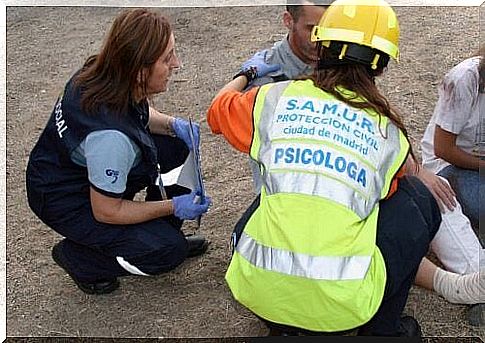What Is A Psychological Debriefing?

A psychological debrief is an intervention that takes place in the first few days after a traumatic event. This event could be a natural disaster (earthquake, flood, etc.), a car accident, or the like.
A group of people who have experienced an event in a similar way comes together for such a debriefing. The aim is to offer focused support to those people who have been involved in the same situation under traumatic conditions. Therefore, one creates a space in which the group members can express their feelings, thoughts and reactions in a safe environment. This is where these people meet to free themselves from the emotional burden that lies on them after a traumatic event. This can help reduce the risk of developing psychological problems as a result of the traumatic event.
Psychologists developed debriefing as a technique designed to help people deal with potentially traumatic events. A psychologist leads these meetings and the group members share what happened to them and how they are feeling. Emergency physicians also value this instrument as a great help in avoiding the aggravation of psychological symptoms. It doesn’t just benefit the victims.

Even professionals suffer
Rescue workers are only human too. They also suffer and sometimes need help. But they are often forgotten. These professionals are at high risk of developing mental health problems because of their job. It is therefore particularly important that you receive help immediately after a traumatic situation.
They are often assigned tasks, regardless of age, education, skills or experience, that are very demanding. This can cause symptoms of acute stress. Sometimes a professional may not even realize that they are working at their limit because intervention during a disaster does not follow a fixed or predictable schedule. Emergency situations are constantly changing, which means that the professional must be able to deal with various circumstances, all of which are stressful. In an emergency situation, he may not be able to follow traditional rules and so will need numerous resources to get his job done. Including the help that is given to himself.
Symptoms that rescue workers may show
A rescue worker can show many symptoms after a disaster:
- Physical symptoms for a professional working under pressure may include tiredness, nausea, chills, or shortness of breath.
- On the cognitive level, the rescuer will certainly be on alert and vigilant. Even so, he can have negative thoughts and may not know how to stop them. In doing so, he may feel restless, speak very quickly, and start screaming during a normal conversation. The mental response is then a combination of fear, fear, irritation and even shock.
To prevent these symptoms from worsening, a psychological debriefing is appropriate, which in German can be translated as “debriefing”. It’s an extraordinary tool.
Why is it important to recognize and respond to our own stress?
Stress can have devastating health consequences. Let’s take a look at some of these symptoms:
At work:
- Impairment of the quality of work
- Increased absenteeism
- Less engagement
- Increased conflicts with colleagues (both with superiors and subordinates)
At home:
- Conflicts with the partner and other family members
- Describe negative comments and experiences that relatives cannot deal with

How does a psychological debriefing begin?
Emergency helpers should be looked after after their assignment. This means that they should be helped after their shift. Dealing with negative experiences should be an explicit, organized process. While group and emotional relief sessions have critics, many organizations use these techniques to help their people manage their emotions after a disaster.
These meetings follow a number of rules. An expert leads these sessions and all participants share their experiences. This includes the individual’s cognitive and emotional responses that occur during the session.
As soon as a rescuer’s shift is over or the rescue is over, the leader should call a relaxed meeting with everyone involved in the rescue. At this meeting, participants are asked to:
- Share your experiences
- Express your feelings
The leader of this intervention session should
- Tell participants in the session what symptoms they are likely to experience in the next few days.
- Explain to participants how best to respond to these symptoms.

Levels of psychological debriefing
The psychological debriefing is not improvised, but is divided into the following stages:
- The objectives of the meeting are explained.
- Each member introduces himself and describes what happened.
- Members then describe what they saw, heard, and thought.
- Each member describes their own reactions. The leader asks each member to focus on the worst they have experienced.
- Each member describes his or her stress reactions that were experienced immediately after the incident or that are currently occurring.
- The leader tells group members that these reactions are normal and explains how to deal with them.
- The leader dispels doubts. There is also an opportunity to say what has not yet been said, whereupon the leader offers additional support.
As we’ve seen, the stress of an emergency can be very difficult to manage. For this reason, the debriefing should take place during the first 24 to 72 hours after the critical incident. The aim of the psychological debriefing is to put the suffering into words, to give the event a structure and to reduce the stress of the helpers. A psychologist can help with this through a structured process.
We should learn to understand the normal reactions that can occur after a traumatic event. We should do this in a place where we feel safe, accompanied and therapeutically guided in the hope that we will feel better afterwards. After the debriefing, emergency responders may still have symptoms. These symptoms include insomnia, self-criticism about your local actions, feeling misunderstood, etc. Therefore, support must be offered on an ongoing basis. Contact persons must be available at all times.









